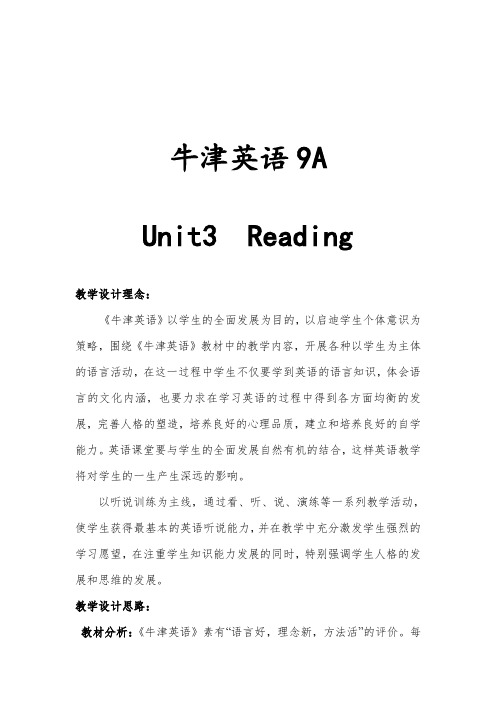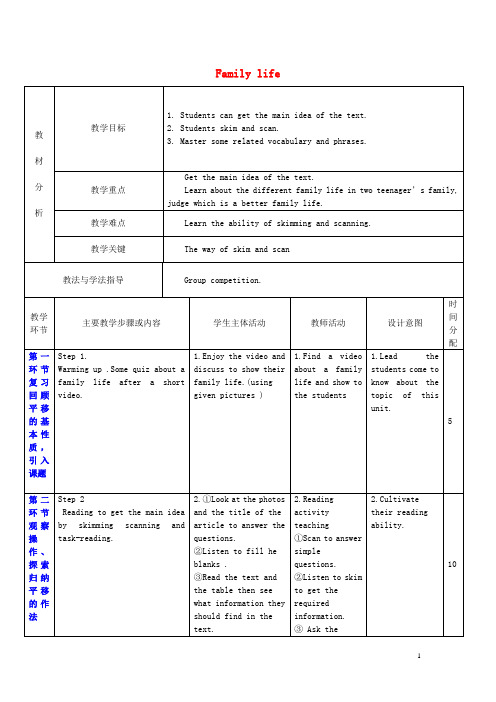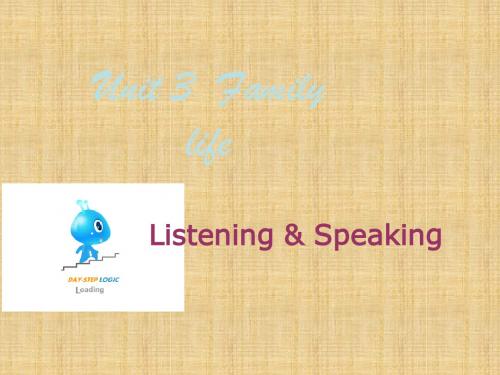2015秋九年级英语上册 Unit 3《Family life》(第6课时)教案 (新版)牛津深圳版
英语九年级上册《Unit 3 Family life Reading: Family life in cities》_6

牛津英语9AUnit3 Reading教学设计理念:《牛津英语》以学生的全面发展为目的,以启迪学生个体意识为策略,围绕《牛津英语》教材中的教学内容,开展各种以学生为主体的语言活动,在这一过程中学生不仅要学到英语的语言知识,体会语言的文化内涵,也要力求在学习英语的过程中得到各方面均衡的发展,完善人格的塑造,培养良好的心理品质,建立和培养良好的自学能力。
英语课堂要与学生的全面发展自然有机的结合,这样英语教学将对学生的一生产生深远的影响。
以听说训练为主线,通过看、听、说、演练等一系列教学活动,使学生获得最基本的英语听说能力,并在教学中充分激发学生强烈的学习愿望,在注重学生知识能力发展的同时,特别强调学生人格的发展和思维的发展。
教学设计思路:教材分析:《牛津英语》素有“语言好,理念新,方法活”的评价。
每个单元都围绕一个话题展开,让学生通过参与、合作、交流、体验、实践、探究等方法学习和使用英语,学生学会用英语完成学习任务。
本课是《牛津英语》9A第三单元第一课的内容。
本单元以“家庭生活”为话题,以家庭生活方式与家庭成员的相处情况为主线。
学生通过本课的学习,了解两名学生不同的家庭生活和他们对家庭生活的感受。
学会自己组织语言来表达自己的感受;通过对文章的了解和讨论,调动学生参与的积极性和听说读写的能力;通过阅读有关家庭生活的采访记录,了解两种不同的家庭生活方式。
学情分析:本课的教学对象是九年级的学生。
进入九年级后学生们更多的展示出对英语学习的兴趣,有些孩子更是表现在各个方面的综合提高。
因此,我在教学中尽量寻找一些他们感兴趣的话题和内容,提高他们运用英语的综合能力。
同时尽量在教学设计的环节中采取多层次,多目标的方式。
鼓励孩子在英语学习的多个方面整体提高。
课前准备:1. 学生收集一些有关家庭生活的资料和相关信息,为讨论做准备。
2.学生收集有关家庭成员相处的相关信息。
3.老师收集有关家庭生活的相关信息。
课程设计:授课类型: 多媒体演示课课时安排: 一课时教学目的:知识与技能:1.能用英语表达家庭活动的英语表达方式。
2015秋九年级英语上册 Unit 3《Family life》教案4 (新版)牛津深圳版

4.Improve the spirit of cooperation and the ability of using words.
3. Students can grasp the detailed information of the listening.
教学重点
Listen and take notes.
教学难点
Focus on listening to information, taking notes of the related information.
3.①Listen and get an overall understanding of the articles.
②Answer the questions on page 38 1&2.
4.①Make a dialogue with the new words in pairs.
②Act out the dialogue in front of the class.
4.①Ask students to make a dialogue using the new words in the listening material in pairs.
②Choose the best group.
2.help students know the meaning of the new words in the listening for according to the pictures, also arouse their interests.
最新广州初三九年级英语上册unit3Familylife课文原文

最新广州初三九年级英语上册unit3Familylife课文原文第一篇:最新广州初三九年级英语上册unit3 Family life课文原文Unit3 Family lifeFamily life in cities Paula interviewed two teenagers for a programme on family life.She asked them some questions.Here are their answers.Emily(aged 15)1 well, there are just three of us: my mum, my dad and me.2 Have I got many possessions? Yes, I’ve got a lot of things: a big TV, a new computer and a mobile phone.3 No, I’m not expected to do the ho usework.4 We go out for dinner together sometimes, but my dad is often abroad on business, and my mum works too.We usually just do our own personal things.5 No, they don’t usually set rules for me and since I’m a good daughter they never punish me.6 Well, I like our new flat.It’s much bigger than our last one.But I feel lonely when my parents are away from home.Jerry(aged 14)1 My mum, dad, grandma and my sister Rosie.Although it sometimes feels crowded in our little flat we don’t mind.No, I haven’t got many possessions.I have no interest in things like fashionable cloth4e.new fashions soon go out of date, don’t they? That’s what my grandma says.3 Yes, I help with the housework.I wash the dishes and even iron my own shirts.My grandma says young people should learn to look after themselves.4 Yes, we like doing things together.We eat meals together every day, and my family always come to school events.5 Yes, I suppose they set some rules for me.For example, unless I finish all my homework, I can’t watch TV, and I can’t go out with my friends either.6 I love all my family very much.We have a close relationship, and we always support each other.More practiceHow to communicate with your parents Many young peoplehave trouble communicating with their parents.However, there are some very useful tips to help solve this problem.First, make a list of the things you and your parents disagree about most.With each of these things, try to find an answer acceptable to both you and your parents.It is no good for you to require everything to go your way.You have to be ready to change a little if you want them to change.Second, talk to your parents when it is convenient for them.Remember that your parents my have to work long hours and this can make them tired, so be patient with them.Third, listen to what your parents have to say.How can you expect them to listen to you if you are not ready to listen to them? In addition, your parents were once young like you, so they understand your situation better than you expect.Finally, if you do not get a satisfactory result, try not to get too angry.Talk with your parents and find out their reasons.Part of growing up is learning to live with these kinds of disagreements, and learning to understand another person’s way of looking at things.W ith a little had work, you can learn to communicate better with you parents.第二篇:初三九年级下学期英语教学计划初三九年级下学期英语教学计划本学期是毕业班学生的关键一学期。
2015秋九年级英语上册 Unit 3《Family life》教案1 (新版)牛津深圳版

5.Discuss in Groups to check the learning sheet.
2.Play the CD for them and tell them the ways of reading.
LearnLeabharlann about the words in this unit according to the words list.
Step 3.Learning the key words (self-study)
2.Read after the CD about the new words.
3.Recongnize the new words as much as possible in every flash.
5. Make them learn to evaluate themselves.
2
第五环节 课后作业
Read the new words until you can keep them in mind.
课
堂
教
学
流
程
Guessing the countries→Imitate the new words→Self-study on the key words→using the new words .
Family life
教
材
分
析
教学目标
1. Students can read and recognize all the new words in this unit.
2015秋九年级英语上册 Unit 3《Family life》教案2 (新版)牛津深圳版

①Scan to answer simple questions.
②Listen to skim to get the required information.
③Ask the students to read then given table and know about what information they should look for.
4.Get students to listen to Emily and Jerry’s story separately to understand the text in detail. Then ask them in groups to raise question about the text and answer.
4.Help the students learn the text in a competition way.
10
第四环节 课时小结
Step 5
Practice A quiz
Step6
Talk time
5.Take an active part in the game .
6. Think about questions and talk about them in groups ,they can try to use example in different aspects of family life to show which is better
5.A competition to arouse interest to make students understand better.
6 Understand the text better.
2015秋牛津版英语九上Uint 3《Family life》ppt课件2

A2
Answer these questions
1.Tony offered to help Joyce three times.
Anything I can do to help? Come on. Let me give you a hand. If you want, I could wash the dishes.
Unit 3 Family life
Listening & Speaking
Family members
Listen and circle
SUNTOWN JUNIOR HIGH SCHOOL: SCHOOL PLAY All parents are invited to come and see The Wrong Trousers, our English-language play. Tickets cost ¥ 10 each. Times Thursday 7 p.m Friday 5 p.m and 8 p.m Saturday 5 p.m and 8 p.m Sunday 7 p.m
Thanks very much, but I can manage.
Amy, do you need any help?
Yes, please. Could you bring me the rubbish bag?
A1
Practise their conversation in pairs
can do to help?
a b c d
The one at 7 p.m. on Thursday The one at 8 p.m on Friday The one at 5 p.m. on Saturday The one at 7 p.m. on Sunday
2015秋九年级英语上册 Unit 3《Family life》教案6 (新版)牛津深圳版

堂
教
学
流
程
Lead in→Revision→Before writing→While writing→After writing→SHOW TIME→development→homework.
效
果
评
价
与
反
思
3.①Show some pictures and ask students to describe.
②Give the following ideas for students to write:
a. the people in your family
b.possessions
c.house work
2.While writing: Imitating.
3.After writing: Check with each other.
2 Fill in the table according to the text.
3.①Write some words and expressions according to the pictures which are related to the writing
1. To improve the reading ability and To lead in to the topic.
5
第二环节 观察操作、探索归纳平移的作法
StepⅡ:Revision
StepⅢ:Revision
1. Before writing: Brain storm to collect some useful word s and expressions.
StepⅠ:Lead in
Reading comprehension.
九年级英语上册 Unit 3《Family life》教案6

②Give the following ideas for students to write:
a. the people in your family
b.possessions
c.house work
3.To practice their ability of language organization and the structure of the writing.
4.To train the students’ cooperation ability.
5
25
第三环节 课堂练习
StepⅣ:SHOW TIME
⑤.Write the article imitating the text and reading comprehension.
⑥and exchange the writing in pairs to give remarks to each other .
2.Make a table to compare Emily’s family life and Jerry’s family life and ask student to compare them by filling the table.
Encourage the students to recommend the better work to let the students to share and improve it together.
5
第四环节 课时小结
StepⅤ. development
Improve your own work and rewrite them.
- 1、下载文档前请自行甄别文档内容的完整性,平台不提供额外的编辑、内容补充、找答案等附加服务。
- 2、"仅部分预览"的文档,不可在线预览部分如存在完整性等问题,可反馈申请退款(可完整预览的文档不适用该条件!)。
- 3、如文档侵犯您的权益,请联系客服反馈,我们会尽快为您处理(人工客服工作时间:9:00-18:30)。
Housework:
(5)Who does the housework in your family?
(6)What housework do you usually do?
教
学
后
记
(总结得失)
教研组长检查签名
指
导
意
见
科组长
检查签名
1.学生以小组为单位,调查组内成员做家务的情况,并填写联系B1的调查表,学生认读和理解单词type。
2.小组派代表根据联系B2的提示,口头汇报调查结果。
通过调查组内成员做家务的情况,从容得到学生的在家表现
基本环节
教师授课过程(教师活动)
学生学习过程(学生活动)
教学意图
深
入
探
究
(引导释疑)
1.教师让学生通过阅读课文的文章内容,并回顾文章内容中的六个方面的采访内容,然后阅读练习A中的提示,并根据提示设计一些问题。如:
Our possessions:
(3)What possessions do your family have?
(4)What possessions do you have?
Housework:
(3)Who does the housework in your family?
(4)What housework do you usually do?
学生将这些记录在A本上的答案拼凑成小短文
检验学生对本节所学内容的整体掌握能力
基本环节
教师授课过程(教师活动)
学生学习过程(学生活动)
教学意图
小结
课文
(梳理归纳)
让学生以“家庭话题重新组织成一份调查报告,并在组内展开调查,然后就调查结果准备一份口头报告。
学生小组与小组之间共同组织
检查学生的组织能力
作
业
布
置
(检查反馈)
1.根据自己设计的问题,选一位同学作调查,并记录他/她的回答,然后根据采访记录撰写一篇题为“…’s family life”的短文,介绍同伴的家庭生活。
2.完成《综合练习册》第39和40页Listening and speaking D,F和第44页Writing的练习。
板
书
设
计
(突出重点)
完成Writing板块的任务,根据所给提示做笔记
当
堂
检
测
(学习诊断)
让学生利用下面问题连成一篇小短文
The people in my family:
(4)How many people are there in your famห้องสมุดไป่ตู้ly?
(5)What are your parents’ jobs?
(6)Who looks after you at home?
初
学
新
课
(初步探究)
1.教师询问学生下列问题,并将答案呈现在黑板上。
Questions:
(1)Do you help with the housework at home?
(2)What do you usually do?
2.教师利用上面的问题先让学生将自己的信息记录起来,然后再让学生以小组和小组之间进行讨论和交流。并评选小组中较好的一位学生的记录内容,然后作为代表再将答案公示在班级文化墙内。
(2)What possessions do you have?
Housework:
(1)Who does the housework in your family?
(2)What housework do you usually do?
2.教师并让成绩较好的学生自己设计问题,并以笔记的形式记录问题的答案,写在练习A本上。
Family life
教学目标
知识与能力
认读和理解单词type
过程与方法
能通过采访,调查组内成员做家务的情况并口头汇报调查结果
情感态度与价值观
能够和小组之间积极合作,共同完成组内成员做家务的情况调查
教学重点
调查组内成员做家务的情况并口头汇报调查结果
教学难点
扩写一篇介绍自己家庭生活得短文
教具准备
多媒体
1.学生设计较好的,教师可让学生补充其他与家庭生活相关的问题,如:
(1)Do you parents give you pocket money every month?
(2)How much pocket money do you get every month?
2.学生阅读练习B的内容。并让学生整理自己在练习A中所作的笔记,然后根据练习B的格式完成作文。
教法运用
小组交流教学法,讲授法,课堂讨论法
学法指导
自主学习,探究学习、合作学习
基本环节
教师授课过程(教师活动)
学生学习过程(学生活动)
教学意图
导
入
新
课
(检查预习)
1.完成Speak up部分的任务,调查组内成员做家务的情况,并向全班同学汇报调查结果。
学生分小组之间将调查的结果记录在记录本上。
给学生复习上节课所学内容并步入本节所学内容
The people in my family:
(1)How many people are there in your family?
(2)What are your parents’ jobs?
(3)Who looks after you at home?
Our possessions:
(1)What possessions do your family have?
The people in my family:
(7)How many people are there in your family?
(8)What are your parents’ jobs?
(9)Who looks after you at home?
Our possessions:
(5)What possessions do your family have?
